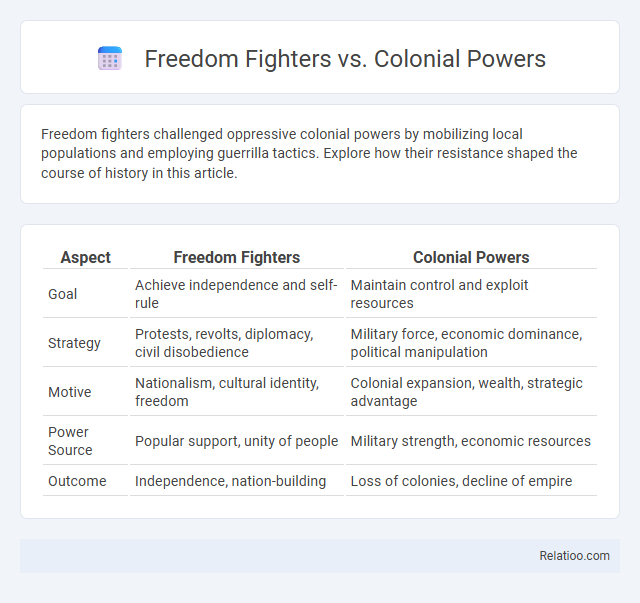Freedom fighters challenged oppressive colonial powers by mobilizing local populations and employing guerrilla tactics. Explore how their resistance shaped the course of history in this article.
Table of Comparison
| Aspect | Freedom Fighters | Colonial Powers |
|---|---|---|
| Goal | Achieve independence and self-rule | Maintain control and exploit resources |
| Strategy | Protests, revolts, diplomacy, civil disobedience | Military force, economic dominance, political manipulation |
| Motive | Nationalism, cultural identity, freedom | Colonial expansion, wealth, strategic advantage |
| Power Source | Popular support, unity of people | Military strength, economic resources |
| Outcome | Independence, nation-building | Loss of colonies, decline of empire |
Historical Context: The Rise of Colonialism
The rise of colonialism in the 15th to 20th centuries marked a period where European powers expanded their empires across Africa, Asia, and the Americas, exploiting resources and subordinating indigenous populations. Freedom fighters emerged as pivotal figures who resisted oppressive colonial regimes through armed struggle, political activism, and cultural revival to reclaim sovereignty and human rights. Understanding this historical context reveals how your nation's independence struggle was shaped by global imperial dynamics and the resilience of those who fought against colonial domination.
Defining Freedom Fighters and Colonial Powers
Freedom fighters are individuals or groups who resist colonial domination to achieve self-determination, often engaging in organized protests, guerrilla warfare, or political activism. Colonial powers refer to imperial nations that exert control over foreign territories through military, economic, and administrative dominance, exploiting local resources and suppressing indigenous governance. Your understanding of this dynamic highlights the complex struggles and sacrifices involved in the quest for independence and national sovereignty.
Motivations Behind Anti-Colonial Struggles
Freedom fighters were driven by aspirations for self-determination, cultural preservation, and economic autonomy, rejecting colonial exploitation and oppressive governance. Colonial powers aimed to maintain political control, extract resources, and suppress dissent to protect imperial interests. The independence struggle was fueled by rising nationalist sentiments, widespread social injustices, and the global spread of ideas about liberty and human rights.
Key Freedom Fighters Across Continents
Key freedom fighters like Mahatma Gandhi in India, Nelson Mandela in South Africa, and Simon Bolivar in Latin America exemplified the global struggle against colonial powers. Their leadership inspired mass movements that challenged imperial dominance through nonviolent resistance, armed rebellion, and political mobilization. Understanding their tactics and sacrifices can empower your knowledge of how diverse strategies contributed to various nations' paths to independence.
Tactics and Strategies of Resistance
Freedom fighters employed guerrilla warfare, sabotage, and covert communication to outmaneuver colonial powers entrenched with superior military technology. Your understanding of their tactics reveals a reliance on local knowledge, asymmetrical warfare, and mass mobilization to undermine colonial control and sustain prolonged resistance. Strategic use of propaganda and alliances further amplified their impact, transforming isolated battles into broader movements for independence.
Colonial Powers’ Methods of Suppression
Colonial powers employed brutal methods of suppression to maintain control, including military force, imprisonment, and censorship targeted at freedom fighters and independence activists. Your understanding of these tactics reveals widespread use of surveillance, propaganda, and economic restrictions aimed at quashing resistance. Violent crackdowns on protests and strategic alliances with local elites further weakened the struggle for independence across various colonies.
Role of International Support and Solidarity
International support played a crucial role in empowering freedom fighters during the struggle for independence by providing essential resources, diplomatic backing, and global recognition. Solidarity movements across continents amplified anti-colonial voices, pressuring colonial powers politically and economically through sanctions and international forums. Notable instances include the Pan-African Congress influencing African liberation, and Cold War dynamics, where superpowers offered strategic aid to independence movements to counter colonial dominance.
Impact on National Identity and Culture
Freedom fighters during the independence struggle profoundly shaped national identity by uniting diverse communities against colonial powers, fostering a shared sense of pride and resistance. Their cultural impact is evident in the revival of indigenous languages, arts, and traditions suppressed under colonial rule, reinforcing Your connection to ancestral heritage. The collective memory of resistance solidified self-determination ideals, embedding values of liberty and sovereignty into the nation's cultural fabric.
Long-Term Consequences of Liberation Movements
Liberation movements led by freedom fighters against colonial powers profoundly reshaped political landscapes, establishing sovereign nations and new governance frameworks. These struggles catalyzed social reforms, economic restructuring, and cultural revitalization, fostering national identity and self-determination. The long-term consequences include persistent challenges in post-colonial development, such as political instability and economic dependency, alongside increased global emphasis on human rights and anti-imperialism.
Lessons from the Fight Against Colonialism
The struggle between freedom fighters and colonial powers underscores the resilience and strategic unity required to dismantle oppressive regimes. Key lessons include the importance of mass mobilization, sustained grassroots activism, and international solidarity to challenge imperial dominance effectively. Understanding these dynamics offers valuable insights into contemporary movements for sovereignty and human rights.

Infographic: Freedom Fighters vs Colonial Powers
 relatioo.com
relatioo.com